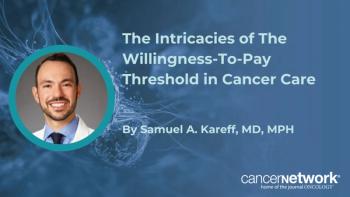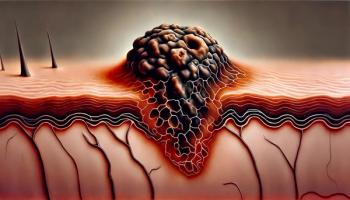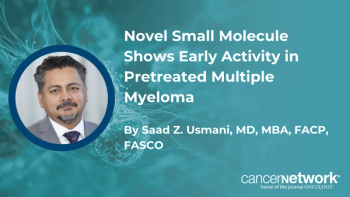
Oncology NEWS International
- Oncology NEWS International Vol 9 No 7
- Volume 9
- Issue 7
NCCN Panel Develops Guidelines for Cancer-Related Fatigue
FORT LAUDERDALE, Fla-Despite the prevalence of fatigue in cancer patients and survivors, a number of obstacles have stood in the way of its successful treatment, said Barbara F. Piper, DNSc, RN, associate professor, University of Nebraska Medical Center College of Nursing. Patients have been reluctant to bring the symptom to their doctor’s attention out of a concern that they may look like “complainers” or that attending to the symptom will somehow interfere with their cancer treatment.
FORT LAUDERDALE, FlaDespite the prevalence of fatigue in cancer patients and survivors, a number of obstacles have stood in the way of its successful treatment, said Barbara F. Piper, DNSc, RN, associate professor, University of Nebraska Medical Center College of Nursing. Patients have been reluctant to bring the symptom to their doctors attention out of a concern that they may look like complainers or that attending to the symptom will somehow interfere with their cancer treatment.
Physicians also have been stymied in their attempts to treat fatigue. The physiological basis of fatigue is poorly understood, and many proposed interventions have not been systematically studied. Its very difficult for us as providers to bring up something that were not quite sure we can treat, Dr. Piper said.
To address these issues, the National Comprehensive Cancer Network (NCCN) convened a panel of experts to create practice guidelines for cancer-related fatigue. The chair of the NCCN Fatigue Guidelines Panel, Victoria Mock, DNSc, director, Oncology Nursing Research, Johns Hopkins Comprehensive Cancer Center, and Dr. Piper presented the guidelines at the Fifth Annual NCCN conference.
In his introduction, Rodger Winn, MD, chair of the NCCN Adult Guidelines Steering Committee, described the study of cancer-related fatigue as a whole new field and discipline of medicine.
Prevalence of Fatigue
Fatigue affects 70% to 100% of patients who are receiving cytotoxic chemotherapy, radiation therapy, or biologic response modifiers, Dr. Mock said. The guidelines describe cancer-related fatigue as an unusual, persistent, subjective sense of tiredness related to cancer or cancer treatment that interferes with usual functioning.
Fatigue went unrecognized for many years until practitioners got better control over the more acute symptoms of nausea, vomiting, and pain. With those symptoms well-managed by medication, patients now describe fatigue as the most distressing symptom associated with cancer and its treatment, according to several studies, Dr. Mock said.
Fatigue affects survivors as well as patients in active treatment, Dr. Piper noted. Its just beginning to be recognized as lasting longer than the treatment period, she said.
Screening for Fatigue
The NCCN treatment pathway advises clinicians to screen for fatigue on the initial visit and periodically thereafter, asking patients to rate their fatigue on a 0 to 10 scale or describe their fatigue as mild, moderate, or severe.
When the fatigue is rated 4 and over, or as moderate or severe, the provider should do a more focused history and physical, Dr. Piper said. This assessment will determine whether the fatigue has progressed and whether there have been associated or alleviating factors. Of particular significance is whether fatigue is interfering with daily activities.
Fatigue may very well be the result of other symptoms. Fatigue commonly clusters with sleep disturbance, anemia, emotional distress (ie, depression), and pain, Dr. Piper said, and may be related to hypothyroidism. If these primary factors are present, by all means treat the underlying cause of the fatigue.
The primary evaluation also calls for an assessment of the patients comorbid-ities, nutritional status, and medications. The provider should also determine whether the patient has an exercise program. Patients who complain of fatigue may have been counseled to get more rest rather than to exercise more. If theyre not exercising, this can lead to the disuse syndrome that we all know from our cardiac rehab days, Dr. Piper said.
Interventions
Exercise, improved sleep habits, and better nutrition were among the non-pharmacologic interventions recommended. Of these recommendations, exercise has the strongest evidence base, Dr. Mock said. Exercise increases functional capacity, leading to a reduced effort and decreased fatigue, she said.
Walking, riding a stationary bicycle, and other forms of exercise were represented in the eight studies conducted with cancer patients and survivors that she cited. These studies are limited in number because exercise has been a novel idea for cancer patients, and the work has progressed slowly, she said.
She added that all of the exercise studies demonstrated significantly lower fatigue and mood disturbance in patients who exercised during treatment, and also decreased sleep disturbance when that was included as an outcome.
Some patients, especially those with extensive disease, should be referred to physical therapy, Dr. Mock said. Any exercise program should be individualized to the patients needs and physical condition.
Restorative therapy, such as gardening, walking outdoors, or taking part in volunteer activities unrelated to illness, was also among the nonpharmacologic interventions recommended.
The panel eagerly awaits the completion of several ongoing clinical trials that are examining the effects of nonpharma-cologic interventions, Dr. Mock said. She added that these trials may lead to the development of more specific guidelines for exercise and other interventions.
Cause-specific therapies are also listed as interventions in the guidelines. Iron, blood transfusions, and erythropoietin (epoetin alfa, Epogen, Procrit) are appropriate interventions for anemic patients. Hypothyroidism should also be treated. Similarly, fatigue associated with depression may be resolved with antidepressants.
Although low-dose corticosteroids and psychostimulants have reportedly helped some patients with fatigue, the panel was not really comfortable with the level of evidence for pharmacologic therapy for cancer patients . . . and [it] hesitated to recommend these until more research has been done in this area, Dr. Mock commented.
In addition to recommending appropriate pharmacologic or nonpharma-cologic interventions, physicians can suggest coping strategies for fatigue. Energy conservation is important. Give them permission to postpone all nonessential activities, Dr. Piper said. Counsel patients to focus on one activity at a time when they have the energy to do so.
Music, television, reading, and socializing are all forms of distraction that may help. Intervention studies have also shown that stress management, including support groups, may be beneficial.
Articles in this issue
over 25 years ago
Couric Urges Doctors to Talk to Patients About Colon Cancerover 25 years ago
Automated Imaging Notification System Close to Fail-Safeover 25 years ago
Higher Dairy Consumption Linked to Prostate Cancer Riskover 25 years ago
First-Year Funding of Early Detection Research Network Completeover 25 years ago
Gritty Antitobacco Ads and More From Legacy Foundationover 25 years ago
Tositumomab Effective for Low-Grade Follicular Lymphomaover 25 years ago
New Awards Spotlight Courage of Cancer Survivorsover 25 years ago
Hospital Volume Shown to Predict Breast Cancer Outcomeover 25 years ago
New Drug Information Websiteover 25 years ago
NCCN Presents Updated Colorectal Cancer GuidelinesNewsletter
Stay up to date on recent advances in the multidisciplinary approach to cancer.












































